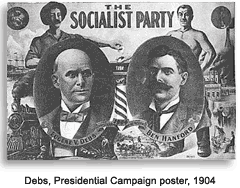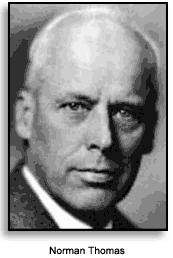Ideas and Movements, 1850-Present
Roots of socialism in AmericaThe roots of socialism in America can be traced to the arrival of German immigrants in the 1850s when Marxian socialist unions began, such as the National Typographic Union in 1852, United Hatters of 1856, and Iron Moulders' Union of North America in 1859. Theodore H. White, author of Fire in the Ashes: Europe in Mid-Century (1953) wrote, "Socialism is the belief and the hope that by proper use of government power, men can be rescued from their helplessness in the wild cycling cruelty of depression and boom."
Progress of socialism
The Socialist Party in America was born and grew dramatically between 1900 and 1912. Under the charismatic leadership of Eugene V. Debs in 1912, 160 councilmen, 145 aldermen, one congressman, and 56 mayors, including Milwaukee, Wisconsin, Berkeley, California, and Schenectady, New York, were elected as Socialists. At the time, Socialists published 300 newspapers, including the Appeal of Reason, which was a Kansas-based publication with 700,000 subscribers. Membership in the Socialist Party totaled 125,000.
Debs converted to socialism while serving jail time for his part in the Pullman Strike in 1897, and began to edit the Appeal to Reason publication. From 1900 to 1920, he ran for president on the Socialist ticket while increasing membership to the Socialist Party tenfold. Although Debs insisted he was a Marxist, he spoke more about poverty and injustice than typical socialist concerns about the class struggle and the dictatorship of the proletariat (Marx).
In 1912, Debs received 900,000 votes, which was six percent of the presidential votes cast that year, principally for his stand against America's involvement in World War I. Debs appealed to blue collar workers hungry for improved working conditions and higher wages, but also such intellectuals as authors Jack London and Upton Sinclair.
Prominently with President Theodore Roosevelt and through the 20th century's first years, the Progressive Movement came into view with its belief in “the perfectability of man, and in an open society where mankind was neither chained to the past nor condemned to a deterministic future; one which people were capable of changing their condition for better or worse.”
The Socialist Party was included within the Progressive Movement. The party dealt with American problems in an American manner. Unlike the Communist Party, the Socialist Party at that time felt no obligation to adhere to an international party line. For example, socialists and other progressives campaigned at the local level for municipal ownership of waterworks, gas and electric plants, and made good progress in such endeavors. In 1911, there were 18 Socialist candidates for mayor, and they nearly won the Cleveland, Ohio, and Los Angeles, California, mayoral races.
In 1905, Upton Sinclair founded the Intercollegiate Socialist Society, which soon had chapters in the leading universities. Lively young men and women discussed the “New Gospel according to St. Marx.” Universities were considered to be favorable ground for progressive thought.
Following the election of 1912, Socialist Party membership began to decline as some members cast their vote for Woodrow Wilson. Others were expelled, such as the Industrial Workers of the World, of which Debs and labor organizer "Mother" Mary Harris Jones had once been members. The IWW had been organized in 1905, grew into a radical, direct-action wing of American socialism by 1910, and had up to 100,000 workers by 1915.
By 1917, Socialist Party membership had slipped to 80,000. Nevertheless, by 1920 Debs managed to garner 919,800 votes for his presidential candidacy, the most a socialist has ever received in America, albeit making up only 3.4 percent of the popular vote. Those votes were representive of Americans' disillusionment with World War I, and of Debs himself, who spoke passionately against the country's involvement in that war.
The Espionage Act of 1917 was crafted to jail “anyone who interferred with the draft or encouraged disloyalty [to America]” and provided for jail sentences of 10 to 20 years. The Sedition Act of 1918 extended further penalties to those found obstructing the sale of U.S. war bonds, discouraging recruitment, uttering “disloyal or abusive language” about the government, the Constitution, the American flag, or even the U.S. military uniform. Under those acts, the government arrested more than 1,500 people, including Eugene Debs.
The Socialist Party's strength was further sapped by 1920, because of government suppression and public disapproval during World War I. Such anti-socialist hysteria as the Red Scare, and internal factionalism aggravated by the presence of Communists, took their toll. Fears associated with the Bolsheviks' seizure of power in Russia, bombings in the United States, along with a series of labor strikes, led to the Red Scare in 1919. Suspected socialists and Communists were arrested and thrown into jail. In the end, of the 5,000 people who were given arrest warrants, only slightly more than 600 aliens were actually deported.
In addition, the party's failure during the 1920s was due to its inability to appeal to the upwardly mobile worker who yearned to be part of the middle class. The party also was divided along racial and ethnic lines.
Their broadest appeal was to the well-educated members of society. In 1928, the Socialist presidential candidate, Norman Thomas, received only 267,835 votes. Thomas was a Princeton graduate and Presbyterian minister in New York. He succeeded Debs after the latter's death as the perennial presidential candidate in the 1928, 1932 and 1936 elections. Thomas stood as more indicative of the Socialist Party member, which was made up of mostly intellectuals and the middle class, rather than a worker's party that Debs had basically represented.
Socialists were also plagued by extreme doubt on the part of most progressives, who were leading the charge to free America from the economic woes of the Great Depression and were weathering deep hostility from conservatives. By the mid-Twenties, the party was deeply divided and failed to revive itself during the depression years of the 1930s.
During the election of 1932, the Socialist and Communist parties, who had insisted that capitalism had collapsed, pulled less than one million votes combined. American voters had grown weary of Republican policies and therefore Democrats won big in both the Senate and the House of Representatives, illustrating that Americans had faith in their country and its institutions. In that election, Norman Thomas received only 892,000 votes.
“Creeping socialism,” an expression used in modern times to describe America's so-called drift towards a socialistic society, was coined by author F.A. Hayek in his book The Road to Serfdom. Published in 1944, Hayek's book warned of the dangers of state control over the means of production, which he perceived to be occurring, especially in regards to the Tennessee Valley Authority (TVA), during the New Deal and the Fair Deal administrations of presidents Franklin Roosevelt and Harry Truman, respectively.
Hayek believed that excessive governmental controls on society did not deliver on their promises and that their ideology actually delivered dismal economic results. But more importantly, he averred, it produces a psychological change in the character of the people in that man's desire to better himself is what drives him to succeed and also improves the way of life for those around him. According to Hayek, socialism strips man of his desire to succeed.
Because of the Cold War, McCarthyism, and dominance of the “Middle American” values, the Communist and Socialist parties virtually disappeared in the 1950s, when membership fell to below 2,000 members. Many Socialists left the party because it was seen that more progressive reform could be achieved through membership in the Democratic Party. Among those who departed were: Walter Reuther, Philip Randolph, and Bayard Rustin. Life was good for the average American, who worked fewer than 40 hours per week. Most received annual two-week vacations and had twice the income to spend as they had during the nation's previous economic boom time in the late Twenties.
During the 1960s and '70s, the Socialist Party exerted little influence on American society because of intra-party conflict, as well as a refusal to support the anti-Vietnam War movement that was sweeping across America. In 1968 at the Socialist Party convention, members passed a resolution to support Democrat Hubert Humphrey for president, instead of nominating their own candidate.
And in 1972, the body chose to support George McGovern for president. But then for the first time in 20 years, in 1976, the Socialist Party decided to run its own presidential campaign with former Milwaukee mayor Frank Zeidler (1948-1960) for president and J. Quinn Brisben, a Chicago teacher, for vice president. Since that time, others have been nominated, including Willa Kenoyer (1988), J. Quinn Brisben (1992) and Mary Cal Hollis in 1996.
Modern socialist movements and organizations
In American society today, socialist groups range in political views from the extreme right to the extreme left. The extreme right wing groups comprise neo-Nazi, anti-Semitic and fascist groups such as the National Socialist Movement or NSM, whose purpose is to “purify” American society through violent and non-violent means. The NSM is said to wear the uniforms and paraphernalia of the Third Reich. According to their website, the NSM is an organization that is “dedicated to the preservation of our Proud Aryan Heritage, and the creation of a National Socialist Society in America and around the world.”
Representing the far left wing are such groups as the Socialist Party U.S.A. That party believes in what is called “Democratic Socialism," defined as “a political and economic system with freedom and equality for all, so that people may develop to their fullest potential in harmony with others.” The party further states that it is “committed to full freedom of speech, assembly, press, and religion, and to a multi-party system” and that the ownership and control of the production and distribution of goods “should be democratically controlled public agencies, cooperatives, or other collective groups.” Other socialist groups include the Democratic Socialists of America, National Alliance, Young Democrat Socialist, and the Democratic Progressive Party.
There are also many “anti-socialist” groups, which include the Future of Freedom Foundation, Sons of Liberty, and the Cato Institute. They express various beliefs regarding socialism in America and the rights of the American public.
Influences of socialism on American society today
The effects of socialism in America can still be felt today. According to the Future of Freedom Foundation, any government-owned, -funded, or -subsidized operation is considered to be a socialist program. For example, publicly owned airports, sports arenas or government-funded universities would be considered socialist operations by that definition.
The Social Security Act of 1935, one of Franklin Roosevelt's New Deal creations, is seen by many as a socialist program because it is a government-organized and -regulated system. Social Security was designed to provide retirement benefits to citizens through mandatory donations to the program during one's employment years.
During the Clinton administration, a plan was proposed to bring down the high costs of health insurance by creating national health insurance. Critics of the national health insurance concept labeled it “socialized medicine” and argued that the individual, not the federal government, had the wisdom and capability to manage his or her own affairs. They argued that deregulation of the health care industry and opening it up to the free market would bring the cost of health care down and increase the availability of care to the American public, which national health insurance would not do.
Off-site search results for "Socialism in America"...
Population and Social Rank in Colonial America
... far more numerous in the South than in the North, but in no place were they socially or politically of much importance.2 The next higher class, the most numerous of all, comprised the traders, shop-keepers, and small farmers -- the rank and ...
http://www.usahistory.info/colonial/population.html
The Populist Party - Democracy in America - Conservative Socialism
The Contract with America, as it was called, had begun. And eleven years later, if we're to believe DeLay, pork is dead and fiscal discipline reigns supreme. This must explain the $2 million wasted on the USS Sequoia Presidential Yacht. Oh, and ...
http://www.populistamerica.com/conservative_socialism
Foreign Affairs - Book Review - Philanthropy and Social Change in Latin America - Edited by Cynthia Sanborn and Felipe Portocarrero
... even as he sources Brazilian leadership in the field to business engagement in the national democratization process. In another smart chapter, Francisco Durand knowingly suggests that Peruvian firms do not solicit tax breaks for their ...
http://www.foreignaffairs.org/20060501fabook85346/cynthia-sanborn-feli ...







 Reply With Quote
Reply With Quote Nicholas Kamm/AFP/Getty
Nicholas Kamm/AFP/Getty 








Bookmarks